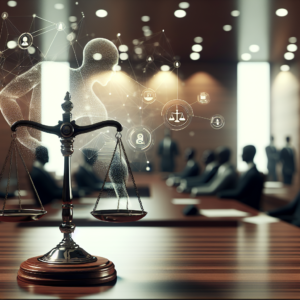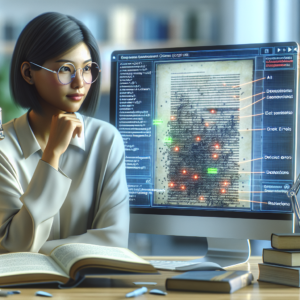This ‘College Protester’ Isn’t Real. It’s an AI-Powered Undercover Bot for Cops
In a world where technology rapidly evolves, the lines between reality and artificial intelligence (AI) are increasingly blurred. The recent emergence of an AI-powered undercover bot masquerading as a “college protester” has ignited a heated debate about privacy, ethics, and the role of technology in policing. The implications of using such advanced technology in law enforcement not only challenge our understanding of personal freedoms but also raise questions about the future of protest and civil rights in the digital age.
The Rise of AI in Law Enforcement
Law enforcement agencies have long relied on technology to assist with crime prevention and investigations. With the rapid advancements in AI, police departments are now leveraging these tools to gather intelligence and maintain public safety. This shift towards AI-driven solutions has seen the emergence of various tools aimed at monitoring and analyzing protests.
Some key points regarding the rise of AI in law enforcement include:
- Data Collection: AI can process vast amounts of data from social media, public records, and surveillance cameras to identify patterns and predict potential protest activities.
- Facial Recognition: Although controversial, facial recognition technology is increasingly used to identify individuals during protests, raising concerns about privacy and civil liberties.
- Behavior Prediction: AI algorithms can analyze behavioral patterns to predict unrest or violent behaviors, allowing law enforcement to intervene before situations escalate.
While the benefits of AI in policing may seem appealing, the ethical implications cannot be ignored.
The AI-Powered Undercover Bot
The AI-powered bot in question has been designed to blend seamlessly into college protests. Posing as a participant, this bot gathers intelligence on protesters and their activities, which can be used by law enforcement agencies. This covert approach raises significant concerns about surveillance, manipulation, and the integrity of peaceful protests.
Some distinct features of this AI bot include:
- Realistic Interaction: The bot is programmed to engage with real protesters, asking questions and discussing topics relevant to the protest.
- Information Gathering: By participating in conversations, the bot collects invaluable data about protest motives and participants.
- Adaptability: The AI can learn from its interactions, allowing it to adapt its approach to remain undetected among genuine protesters.
While the technology demonstrates impressive capabilities, it raises ethical questions about its use in policing and its implications for free speech.
Implications for Privacy and Civil Liberties
The deployment of AI bots in protests has sparked a fierce debate surrounding individual privacy rights and civil liberties. Critics argue that the use of these bots constitutes an invasion of privacy and ultimately undermines the very essence of protest.
Key implications include:
- Chilling Effect on Free Speech: The knowledge that AI bots are monitoring protests may deter individuals from exercising their right to free assembly and expression.
- Erosion of Trust: The use of AI bots in ostensibly peaceful gatherings can lead to distrust between law enforcement and the public, potentially harming community relations.
- Accountability Concerns: If an AI bot gathers information that leads to arrests or legal repercussions, questions arise about the accountability of law enforcement and the ethical use of technology.
It is essential for society to grapple with these implications as technology continues to advance.
Ethical Considerations in AI Deployment
The rapid deployment of AI tools in law enforcement requires a thorough ethical examination. Policymakers and law enforcement agencies must ensure that technology enhances public safety without infringing upon individual rights.
Some ethical considerations include:
- Transparency: Law enforcement should disclose the use of AI tools and the extent to which they monitor public gatherings.
- Oversight: Implementing independent oversight mechanisms can help ensure that AI is used ethically and responsibly in policing practices.
- Public Input: Engaging with the community and activists can provide valuable insights into concerns and expectations surrounding the use of AI technology.
As technology advances, these ethical considerations will become increasingly important to shape public policy and maintain a balance between safety and civil liberties.
The Future of Protests and Technology
The advent of AI-powered bots in protests presents both challenges and opportunities. While they can assist law enforcement in maintaining order, their use poses serious ethical dilemmas that demand careful consideration.
Looking ahead, the future of protests in a technologically advanced society will likely involve:
- Increased Surveillance: The potential for increased surveillance of protest activities, leading to more stringent policing measures and possible government overreach.
- Advancements in AI Ethics: The development of ethical frameworks and guidelines governing the use of AI in law enforcement to protect civil liberties.
- Public Awareness: Heightened awareness and education about the role of technology in protests, empowering citizens to understand their rights and how to protect them.
As society grapples with these changes, it is crucial to ensure that the use of technology in policing does not come at the expense of fundamental freedoms.
Conclusion
The emergence of AI-powered undercover bots in protests marks a significant turning point in the intersection of technology and civil liberties. As law enforcement agencies continue to harness the capabilities of AI, it is imperative to address the ethical implications and potential consequences for individual rights and freedoms.
By fostering open discussions about the role of AI in policing, society can strive for a future where technology enhances public safety without infringing on the rights of individuals. Balancing the benefits of innovation with the need for ethical oversight is essential to safeguard the values that underpin a democratic society.



